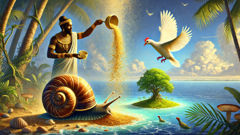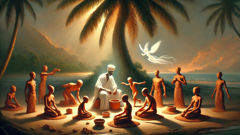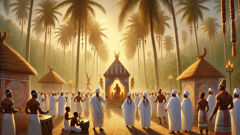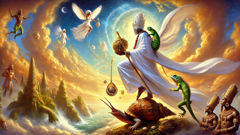Introduction
In the heart of West Africa, beneath the endless sky and where rivers carve their winding paths through emerald forests, the Yoruba people have long gathered around flickering fires to share the story of creation—a tale that begins before time, before earth, before even memory itself. The universe, in those primordial days, was not as we know it now. It was formless, an endless expanse of water and mist, silence broken only by the gentle breath of Olodumare, the supreme source and keeper of all destinies. Above this boundless ocean was Orun, the sky realm, bright and vibrant, where powerful Orishas—the divine spirits—lived in harmony and awe of their creator. Among these Orishas was Obatala, revered for his gentle wisdom and unyielding compassion, his spirit as pure as the white cloth he always wore. Obatala, the sky father, would one day be entrusted with a task that would shape not just the land, but the very essence of humanity: to descend from the heavens and create the Earth itself. The story of Obatala is more than a myth; it is a lesson, a cultural heartbeat that pulses through Yoruba identity. It is a tapestry woven with reverence for nature, humility before the divine, and the enduring hope that kindness and patience will shape the world for the better. The journey of Obatala is not just one of creation—it is one of transformation, of trials and forgiveness, and the delicate molding of life from spirit and clay. This is the story of how the world gained its form, how people came to walk the land, and how the white-robed Orisha’s gentle hands shaped destinies under Olodumare’s watchful gaze.
The Divine Mandate and Descent
In the beginning, there was only the endless expanse of water. Orun—the sky realm—shone above, home to the Orishas, each a spark of Olodumare’s will. There was no land, no trees, no creatures. Only the mystery of what could be, waiting for purpose. Olodumare, the all-knowing, saw the need for balance and beauty, and so called upon the Orishas to discuss the creation of earth. Among them, Obatala stood out—not for power or might, but for his humility and love for all beings. He was chosen because his heart was free from pride and his wisdom deep as the ocean’s own silence.

Olodumare called Obatala to the center of Orun. The gathering shimmered with the presence of divine beings. Obatala knelt before the source of all light and listened as Olodumare spoke: “The world below waits to be shaped. Go forth and mold it, so life may flourish.”
Obatala accepted this task with reverence. He was given a small snail shell filled with sacred earth, a white hen with seven perfect feathers, a palm nut for growth, and a long golden chain forged by Ogun, the Orisha of iron and transformation. Each item carried the essence of possibility. The other Orishas watched as Obatala, guided by faith and humility, prepared for a journey that had never been made before.
The descent from Orun was a moment of awe. Obatala took hold of the golden chain, its links glowing with celestial fire. He dangled it down from the edge of Orun, watching as it stretched endlessly toward the waters below. The chain swayed gently in the cosmic breeze. Taking a breath as pure as the morning dew, Obatala stepped off the edge of the sky. Down he went, suspended between heaven and nothingness, clutching his sacred items close to his chest. With every passing moment, the air grew thick with mist and the sound of churning waters rose to meet him.
He finally reached the bottom of the chain, but there was still a small distance to the water’s surface. Here, he released the contents of the snail shell, letting grains of sacred earth fall and scatter across the water. As the earth spread, it formed an island—small at first, but solid. The white hen was released, and she began to scratch and peck at the earth, spreading it wider and wider until land emerged, shaped and textured by her every movement. The chameleon tested the ground, step by cautious step, ensuring it was firm enough to bear life. Obatala planted the palm nut at the center of this new land, blessing it with growth and promise.
This first land was called Ife, “the place of expansion.” It was lush and green, warmed by the gaze of Olodumare. The Orishas gazed down in wonder as Obatala surveyed his work, understanding that this new world would become the cradle of life. Yet, the journey was only beginning. Obatala would soon face trials that would test the very core of his wisdom and spirit.
The Shaping of Humanity and Obatala’s Trial
With the land of Ife spread beneath his feet, Obatala took up his role as molder of life. He walked the new earth, feeling its coolness and softness, marveling at how silence now gave way to the whispers of growing grass and the sigh of the wind. He sat beneath the first palm tree and gathered clay from the riverbanks—earth mixed with the water that once covered all. There, in the shade, he began to shape figures: heads with thoughtful brows, arms made for embracing, legs to run across the land. He molded each form with care, seeking to infuse them with beauty, purpose, and the gentle wisdom he carried in his heart.

For days and nights, Obatala worked in solitude. He sang quiet songs as his hands sculpted humanity’s first forms. Each was unique—some tall, some small, some dark as fertile soil, others light as morning sand. He saw in every face the possibility of laughter, struggle, joy, and sorrow. When he finished shaping, he called out to Olodumare, who breathed the spark of life into the figures. Thus, humanity awoke under the gentle gaze of their creator.
But the work was exhausting, and Obatala’s spirit began to tire. One day, longing for rest, he came upon a sweet-smelling liquid: palm wine, drawn from the very tree he had planted. Unfamiliar with its strength, he drank deeply, seeking comfort. The wine clouded his mind. His hands, once steady and sure, became unsteady. As he continued his work in this state, some of the figures he molded were not as he intended—some were bent, others misshapen. When Obatala realized what had happened, his heart filled with sorrow and regret.
He wept for those he had formed while not in control of his senses. Olodumare, seeing Obatala’s humility and grief, comforted him: “You did not mean harm. From your hands all life comes, in its beauty and its difference. Your compassion is your strength.” Obatala vowed from that day never to taste palm wine again and became the protector of those born with physical differences—the ones sometimes called the “children of Obatala.”
Obatala’s humility in the face of his mistake became a lesson cherished by generations. He walked among his creations, teaching them kindness, patience, and reverence for all forms of life. The Orishas admired his gentleness and saw that wisdom sometimes grew best from honest reflection and repentance. Through these trials, Obatala’s legend grew—not only as creator but as guardian of dignity, inclusion, and mercy.
Legacy and Lessons of Obatala
As the generations passed, the children of earth flourished under the watchful eyes of the Orishas. Ife became a center of wisdom and culture, a place where the people honored their origins with song, dance, and storytelling. Obatala’s name was spoken with reverence in every home and temple. His white garments became a symbol of purity, his gentle manner a model for leaders and parents alike. Festivals blossomed in his honor, where offerings of white cloth, chalk, and soft music were laid at his shrines.

Yet Obatala’s influence was never one of dominance or fear. He walked among people in quiet disguise, blessing those who showed compassion to others—especially those who were different or in need. It’s said that when storms threatened the fields or illness spread, Obatala was there with a calming hand and wise counsel. He encouraged people to look beyond surface appearances, to treat all beings as family, for all shared a common origin in his clay.
The lesson of Obatala’s trial resonated through time. Parents taught children to admit mistakes and make amends, to show patience with themselves and others. Artists and craftsmen invoked his name when beginning new work, seeking his steady hand and clear mind. When facing challenges, people remembered how Obatala’s humility had transformed a mistake into a blessing—a reminder that even the gods could err and grow wiser for it.
The other Orishas respected Obatala’s unique gifts. Ogun, the master of iron, admired his endurance; Yemoja, mother of waters, cherished his nurturing spirit. Eshu, the messenger and trickster, sometimes challenged Obatala’s patience, but even he could not shake the sky father’s tranquil heart. Olodumare continued to watch from Orun, pleased with how Obatala’s example spread harmony and justice across creation.
To this day, Obatala’s story is recited in Yoruba homes and across the diaspora. His myth shapes not only religious rituals but everyday acts of kindness, unity, and self-reflection. Through Obatala, the Yoruba people teach that creation is ongoing—a dance between spirit and earth, humility and wisdom—and that every life holds a spark of the divine.
Conclusion
The myth of Obatala is far more than a story of how earth and humanity came to be—it’s a living testament to the Yoruba way of seeing the world. In every grain of sand and in every breath drawn by those who walk the land, there echoes the gentle touch of the sky father. Obatala’s legacy reminds us that true wisdom grows not from power or pride, but from humility, kindness, and the courage to acknowledge our imperfections. His story continues to inspire people across Nigeria and beyond, encouraging all to see beauty in diversity and to find strength in compassion. When we celebrate Obatala, we celebrate the creative spirit within ourselves—the hope that even in our flaws, there lies the potential for grace. As long as his myth is told, the lessons of patience, inclusion, and gentle transformation will guide new generations, just as they have shaped the world since the dawn of time.













